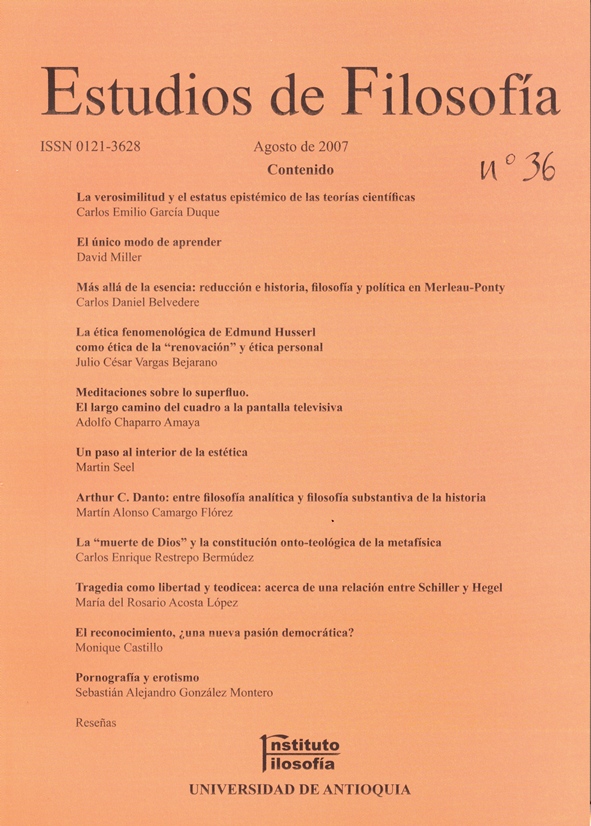Phenomenological ethics of Edmund Husserl as ethics of “Rrenovation” and personal ethics
DOI:
https://doi.org/10.17533/udea.ef.12738Keywords:
Phenomenological Ethics, will, pulsional tendency, valour, person, renovationAbstract
The relatively recent publication of the press articles in the Japanese magazine Kaizo, entitled “Renovation of man and culture” (1923-1924) and the ethical classes given by Husserl in the years 1920 and 1924 enable us to approach to the new course that his ethical reflections took. Likewise, these texts allow us to understand the critical position of Husserl to his rst version of his Ethics, which was characterized by being a universal doctrine of values based on a formal Axiology. Since the twenties Husserl presents a novel conception of his Ethics, and its main foundation is the resolution of the radical subject and volitive by means of a life devoted to responsibility and love. This work shows how such a change was possible and the general traits of this version of Ethics that can also be termed “personalistic”.
Downloads
References
HUSSERL, E. Husserliana [Hua]. Gesammelte Werke. Martinus Nijhoff, Den Haag/Dordrecht, 1950, 38 Bänden.
___________. Ideen zu einer reinen Phänomenologie und phänomenologischen Philosophie. Erstes Buch [Hua 3]. Neu hrsg. v. K. Schuhmann, 1976 [Ideen I].
___________. Ideen zu einer reinen Phänomenologie und phänomenologischen Philosophie. Zweites Buch. Phänomenologische Untersuchungen zur Konstitution [Hua 3]. Hrsg. v. W. Biemel, 1976 [Ideen II].
___________. Die Krisis der europäischen Wissenschaften und die transzendentale Phänomenologie. Eine Einleitung in die phänomenologische Philosophie [Hua 6]. Hrsg. v. W. Biemel, 1954.
___________. Erste Philosophie (1923/24). Zweiter Teil. Theorie der phänomenologischen Reduktion [Hua 8]. Hrsg. v. R. Boehm, 1959.
___________. Phänomenologische Psychologie. Vorlesungen Sommersemester 1925 [Hua 9]. Hrsg. v. W. Biemel, 1962.
___________. Analysen zur passiven Synthesis. Aus Vorlesungs- und Forschungsmanuskripten 1918-1926 [Hua 11]. Hrsg. v. M. Fleischer, 1966.
___________. Zur Phänomenologie der Intersubjektivität. Texte aus dem Nachlaß. Erster Teil, 1905-1920 [Hua 13]. Hrsg. v. I. Kern, 1973.
___________. Zur Phänomenologie der Intersubjektivität. Texte aus dem Nachlaß. Zweiter Teil, 1921-1928 [Hua 14]. Hrsg. v. I. Kern, 1973.
___________. Zur Phänomenologie der Intersubjektivität. Texte aus dem Nachlaß. Dritter Teil, 1928-1935 [Hua 15]. Hrsg. v. I. Kern, 1973.
___________. Aufsätze und Vorträge (1911-1921) [Hua 25]. Hrsg. v. Th. Nenon und H.R. Sepp, 1987.
___________. Aufsätze und Vorträge (1922-1937) [Hua 27]. Hrsg. v. Th. Nenon und H.R. Sepp, 1989.
___________. Vorlesungen über Ethik und Wertlehre 1908-1914 [Hua 28]. Hrsg. v. U. Melle, 1988.
___________. Aktive Synthesen: Ausder Vorlesung "transzendentalen Logik“ 1920/21 [Hua 31]. Hrsg. v. Roland Breuer, 2000.
___________. Zur Phänomenologische Reduktion. Texte aus dem Nachlaß (1926-35) [Hua 34]. Hrsg. v. Sebastian Luft, 2002.
___________.Einleitungindie Philosophie. Vorlesungen 1922/23[Hua35]. Hrsg. v. B. Goossens, 2002.
___________.Einleitungindie Ethik. Vorlesungen Sommersemester1920/24 [Hua 37]. Hrsg. v. Henning Peucker, 2004.
Textos de Husserl que aún no están editados en las obras completas:
Husserl, E. Wert des Lebens. Wert der Welt. Sittlichkeit (Tugend) und Glückseligkeit . Hrsg. Ulrich Melle. Husserl Studies, Dordrecht, vol. 13 (3), 1997, pp. 201-235. DOI: https://doi.org/10.1007/BF00366577
Bibliografía secundaria
AGUIRRE, A. Zum Verhältnis von modaler und praktischer Möglichkeit. Phänomenologische Forschungen, Freiburg/München, vols. 24-25, 1991, pp. 150-182.
BRENTANO, F. Vom Ursprungsittlicher Erkenntnis. Felix Meiner, Hamburg, 1969. DOI: https://doi.org/10.28937/978-3-7873-2619-8
FINK, E. ¿Qué se propone la fenomenología de Edmund Husserl? Trad. de Raúl Iturrino Montes. Diálogos. Revista del Departamento de Filosofía, Universidad de Puerto Rico, Río Piedras, vol. 25 (56), julio de 1990.
HOYOS, G. Intentionalität als Verantwortung. Geschichtsteleologie und Teleologie der Intentionalität bei Husserl. M. Nijhoff, Den Haag, 1976.
__________. La ética fenomenológica como responsabilidad para la renovación cultural. En: Husserl, E. Renovación del hombre y de la cultura. Cinco ensayos. Anthropos, Madrid, 2002.
MELLE, U. Husserls personalistische Ethik. Conferencia en las Jornadas Husserl del Archivo Husserl de Colonia, realizadas el 26 de octubre de 2003.
SALINAS, P. Razón de amor. Cátedra, Madrid, 1996.
Downloads
Published
How to Cite
Issue
Section
Categories
License
Copyright (c) 2007 Estudios de Filosofía

This work is licensed under a Creative Commons Attribution-NonCommercial-ShareAlike 4.0 International License.
Authors who publish with this journal agree to the following terms:
1. The Author retains copyright in the Work, where the term "Work" shall include all digital objects that may result in subsequent electronic publication or distribution.
2. Upon acceptance of the Work, the author shall grant to the Publisher the right of first publication of the Work.
3. The Author shall grant to the Publisher a nonexclusive perpetual right and license to publish, archive, and make accessible the Work in whole or in part in all forms of media now or hereafter known under a Creative Commons Attribution-NoCommercia-ShareAlike (CC BY-NC-SA 4.0), or its equivalent, which, for the avoidance of doubt, allows others to copy, distribute, and transmit the Work under the following conditions: (a) Attribution: Other users must attribute the Work in the manner specified by the author as indicated on the journal Web site;(b) Noncommercial: Other users (including Publisher) may not use this Work for commercial purposes;
4. The Author is able to enter into separate, additional contractual arrangements for the nonexclusive distribution of the journal's published version of the Work (e.g., post it to an institutional repository or publish it in a book), as long as there is provided in the document an acknowledgement of its initial publication in this journal;
5. Authors are permitted, and Estudios de Filosofía promotes, to post online the preprint manuscript of the Work in institutional repositories or on their Websites prior to and during the submission process, as it can lead to productive exchanges, as well as earlier and greater citation of published work (see The Effect of Open Access). Any such posting made before acceptance and publication of the Work is expected be updated upon publication to include a reference to the Estudios de Filosofía's assigned URL to the Article and its final published version in Estudios de Filosofía.















